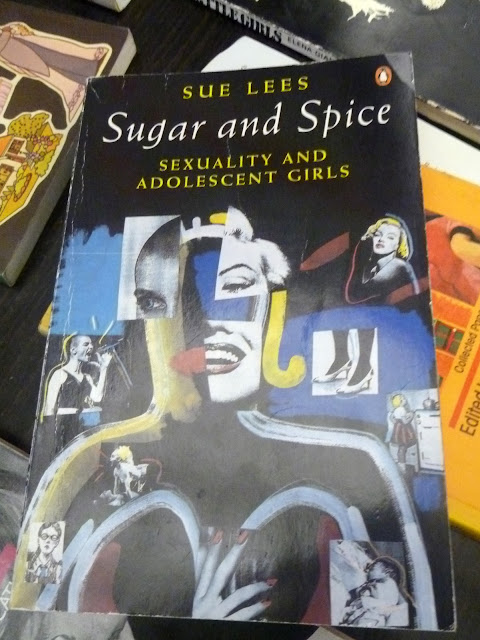The aim of the event, which lasted around six hours, was to celebrate the campaigning achievements of the last forty years, to remind ourselves of how things have changed and how so much of what we take for granted today was achieved because women took a stand and fought for their rights in the 1960s, 70s and 80s.
Lots of women came and we discussed, laughed, reminisced and thought about what the future holds. It was a real celebration.
All around the hall there were displays that consisted of old posters, photographs, newspaper clippings, displays of the books we read at the time, and lots more. We were reminded of all the campaigns we got involved in: for equal pay, to end discrimination on the grounds of gender or sexual orientation, for adequate nursery provision, for a woman's right to choose, for contraception to be available and safe, against the objectification and abuse of women in pornography, for the streets to be safe for women, for the end of domestic violence, for the end of sexual violence and rape against women and children, for an end to all violence against women, for housework to be recognised as work and to stop being seen as an exclusively female occupation, for a society that gave women and men the chance to fulfil their potential.
This is when it all started
and this is during the second wave of Feminism, the Reclaim the Night march in Leamington in 1985
this is the kind of event that we got involved in
and this - women and men mobilising against the Corrie Bill, one of the many attempts over the years to limit women's right to choose
so many new and exciting books that opened up whole new worlds for all of us and made the future look full of limitless possibilities. Amongst others we read the following:
Woman's Estate, by Juliet Mitchell, a socialist woman and one of the first to attempt to fuse feminism and socialist theory. Mitchell approached the subject of women's oppression from the perspective of the specific function women's roles play under free market capitalism. Her book was not about how awfully men treated women but about how women's unpaid labour was critical to the success of capitalism. Women's oppression was a product of capitalism and class society and men were victims in that too.
Socialist/feminist ideology was summed up by this iconic poster
Ann Oakley's, The Sociology of Housework, a seminal work that analysed women's role as never before, opening up the family and the relationships within it. It made people look at women and housewives in a new way, housework was assessed alongside paid employment and the work of the housewife was shown as alienating, exploitative and no better than the lowest of menial tasks.
The Female Eunuch, by Germaine Greer, written in 1970, a book full of passion that deeply shocked when it first came out, a book that concentrated on the everyday relations between men and women and more specifically, the minutae of women's lives and how awful and oppressive they were.
"Women have very little idea of how much men hate them". She demolished ideas about love and romance, painted a bleak portrait of marriage in the 1960s, horrified about the nuclear family and what it did to women and children : "mother is the dead heart of the family", she wrote.
Sexual Politics by Kate Millet, a book about how thoroughly culture and society are dominated by men. She studied women in art, literature, psychology and politics. In her section on literature Millett criticised established and revered authors like Miller, Lawrence, Mailer and this made it the subject of huge controversy. It painted the picture of a complacent society that fully accepted the establishment. It became a classic -- Norman Mailer responded with a piece called 'The Prisoner of Sex'.
Sugar and Spice by Sue Lees, focused "on the way masculine and feminine identities are constituted and reconstituted, developed and resisted in the day to day life of adolescent girls and boys". She showed the many ways that young women were mistreated by their peers and the establishment. How girls dealt with the contradictory messages about feminine identity in a society full of contradictions about what constitutes being a woman.
Gyn-ecology by Mary Daly, a radical feminist book. Daly attempted to reclaim language and to move towards the emergence of a 'metrapatriarchal' women's consciousness.
One of the displays was the model of May Jemison, American doctor and NASA astronaut who became the first black woman to travel in space when she joined the crew of the space shuttle 'Endeavour' in Sept. 1992. The model was made by Year 6 pupils at Sydenham Primary School as part of their work for a Black History project.
In one corner of the hall a group of women were knitting one square each to make a quilt which would be used at the Women's Refuge.
It was a great and thoroughly enjoyable day and a great thank you to the women who organised the event.

















No comments:
Post a Comment